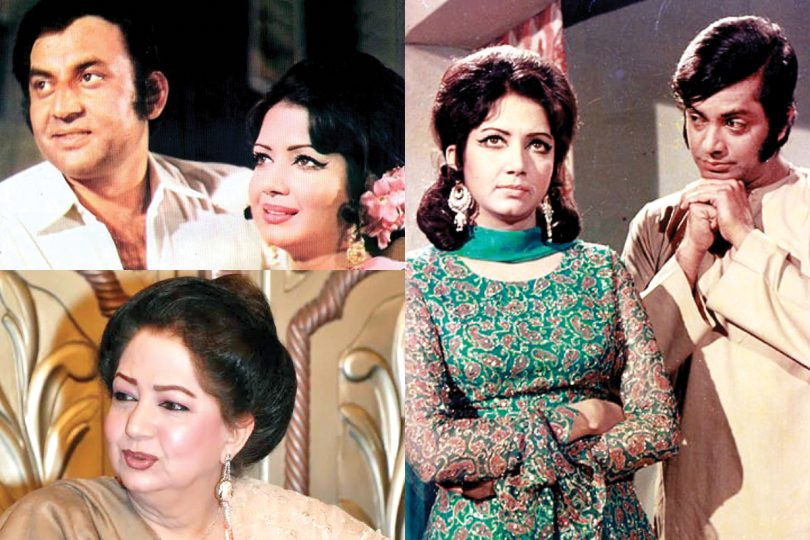Zeba Begum – The First Lady of Pakistani Cinema
BOLD pays tribute to veteran actress Zeba Begum who celebrated her 77th birthday earlier this month
Whenever the history of Pakistani cinema would be written, the name of Zeba Begum would be there amongst those who helped Pakistani films find fame and popularity across the globe. During the 1960s and the 1970s, she was not just on top of her game but also featured in films that would change the way films were being made in the country.
Tue to her name, Zeba wasn’t just a pretty face, which dominated the scene but she was one of the few actresses who dared to play characters that others had to think twice about. She played a young-to-old character in Insaan Aur Aadmi before she turned 25, was amongst the first actresses to play a tomboyish character in Mohabbat Zindagi Hai, and returned to films when the then Pakistan President requested her to represent the country abroad.
After bidding farewell to her acting career, she continued her association with the film industry and appeared as the unofficial First Lady of the industry and served as the chairman of one of the three censor boards in the country. Earlier this month on 10th September, the veteran actress celebrated her 77th birthday, and there is no better time to pay a tribute to her legacy, than on her big day. Read on:
Phase one – The initial years

Zeba Begum was born Shaheen Bano in the United Indian city of Ambala, Punjab on 10th September 1945, and migrated with her family to the newly-created Pakistan when she was three years old. After completing her education, she changed her name to Zeba when she ventured into films and initially struggled since her competition was with Sabiha Khanum, Nayyar Sultana, and Musarrat Nazir who were ruling the screen. However, what set her apart from others was her beauty, elegance, and ability to take on difficult characters and that’s why after she made her debut with Chiragh Jalta Raha, no one was able to stop her from rising to the top.
Before she became the leading lady of Waheed Murad in the 1960s, she appeared in his home production Jab Se Dekha Hai Tumhein opposite Darpan. The success of the film made her every director’s first choice heroine since they were on the lookout for someone who could be paired with the younger leading men. Her first hit pairing was with Syed Kamal with whom she gave numerous hit flicks like Tauba, Aashiana, and Aisa Bhi Hota Hai between 1963 and 1965, however, Heera Aur Pathar changed the dynamics.
Produced by Waheed Murad, the film featured him as the leading man as well, and thanks to Pervez Malik’s direction, Masroor Anwar’s lyrics, and Sohail Rana’s music, it went on to establish the ‘chocolate hero’ as the most desirable bachelor. However, without Zeba, his career might not have begun as well as it did, since she was the leading lady of nearly all of his successful films between 1964 and 1967.
They were there in Kaneez and Eid Mubarak (both 1965), went on to appear in Armaan and Jaag Utha Insaan (both 1966), and were part of Maa Baap, Rishta Hai Pyar Ka, Ehsaan, and Insaniyat (all 1967) after making it big with Heera Aur Pathar. Besides being good-looking and charming, Zeba was able to play different kinds of characters that included getting married for the sake of her daughter, falling in love despite being already married, and playing a Cinderella-esque ‘sister’ who takes the blame to save her cousin after she is suspected of having an affair.
It was her performance in Armaan (the film where she played Cinderella to Waheed Murad’s Prince Charming) that not only helped her career but also heralded it towards the top. At the time of its release, it was the most successful Pakistani flick of all time, and when it completed its Platinum Jubilee – 75 weeks in cinemas – Waheed Murad and Zeba were the talk of the town. If he had performed the romantic version of Akele Na Jana, then she was the one who breathed life into the tragic tandem that helped the film end on a happy note.
Nearly all their films did well at the box office and although they weren’t cast opposite each other in Josh, their chemistry as the leading man and the leading lady always set the screen on fire. However, there was another actor with whom she had shared the screen and with whom she was romantically involved, unknown to her fans. His name was Mohammed Ali and on September 1966, Zeba suddenly married her Chiragh Jalta Raha co-star with whom she went on to deliver a number of hits, including the first few as the co-producer.
Phase two – The Ali Zeb years

Although Zeba had been married twice before tying the knot with Mohammed Ali (with Khawaja Rehmat Ali and film actor Sudhir), her innings as Mrs. Mohammad Ali saw her approach change towards films. She refused to work with other leading men of the day, including her former romantic leads Waheed Murad, Syed Kamal, and even upcoming actor Nadeem. Whenever she acted in a film with Waheed Murad or Nadeem, it was either as a sister-in-law or as a former lover (in case of Nadeem in Daman Aur Chingari).
It was during this period, however, that she turned producer and helmed Aag and Jaise Jantey Nahi with her husband which kick-started her second coming. If Mohammed Ali was on the lookout for a reliable partner, so was Zeba and the two complimented each other in such a way that whenever they were paired together, it more or less guaranteed that the film would do well. They went on to become the most charismatic pair in the history of Pakistani cinema and continued to rule the screen for two more decades.
Her best performance came in Insaan Aur Aadmi where she played Mohammed Ali’s love interest before being forced to marry another man. Not only did the role give her the chance to play the rare young-to-old character that leading ladies usually avoid but she excelled in both. At 25, she not only played the young girl with conviction but as Talat Hussain’s mother (whom he had not met before), she was on top of her game.
After proving her class as an actress, Zeba continued to act in films but as an older woman, giving younger actresses like Babra Sharif and Mumtaz the space they needed to shine as leading ladies. She was paired with her husband in all her films but managed to carve a separate identity for herself in all the characters she played. She got her third Nigar Award for Best Actress (the first one was for Armaan, the second one for Insaan Aur Aadmi) for Mohabbat where she outshone everyone else, including her husband Mohammed Ali. In Mohabbat, she played the main lead as the woman whose fortunes change with the passage of time.
Phase three – The comeback years

For the first dozen years of her career, Zeba was the leading lady every director wanted to have in their films but after 1974, she began to keep a low profile and although her films managed to do well, she didn’t stay as active as her rivals. However, she took her position as the unofficial ‘First lady of Pakistani cinema’ seriously and represented the country wherever her husband Mohammed Ali went. It was due to their popularity abroad that the late President of Pakistan General Zia ul Haq asked Mohammed Ali and Zeba to represent Pakistan in veteran actor Manoj Kumar’s film Clerk, a move that resulted in failure but the Pakistani couple had nothing to do with it.
In a film that was supposed to lessen the tensions between the two countries, actor and director Manoj Kumar deliberately edited scenes featuring Mohammed Ali and Zeba, and even made the tall Pakistani actor play his elder crippled brother, which didn’t sit out well with the Indian or Pakistani fans of Mohammed Ali and Zeba. It was the only time when Ali Zeb (as they were commonly referred to) worked in an Indian film, but it wasn’t their first international venture. That distinction goes to Tiger Gang which was a co-production between Italy and West Germany and was titled FBI Operation Pakistan in the West.
Also, Clerk wasn’t their last hurrah together, it was Mohabbat Ho To Aisi Ho which came out in 1989. Not many know but the film initially had Waheed Murad playing the second hero but since he died suddenly in 1983, it was shelved until actor using Sherry Malik replaced the deceased actor and it was completed in 1989. After quitting acting in the 1980s, Zeba Begum supported her husband Mohammed Ali in his charity work. They founded Ali-Zeb Foundation in the mid-90s to help Thalassemia patients across the country which continues to aid those in need for free treatment. She was also voted amongst the 25 greatest actors of Asia (along with her husband Mohammed Ali) in a poll conducted by none other than the CNN, and if that doesn’t prove Zeba Begum continued to remain associated with films after her husband’s death in 2006, but not in front of the camera, but as the Chairman of the Punjab Censor Board. Despite turning 70, she used her experience to rate films and must be complimented for a job well done, since it was during her tenure that the cinema industry revived with films like Na Maloom Afraad. Although she was criticized for banning Shoaib Mansoor’s Verna in 2017, her point of view was appreciated when the film failed at the box office due to the bad execution of a sensitive subject. One hopes that she continues to inspire generations of actors and filmmakers and imparts her experience to them, so that Pakistani cinema returns to its former glory, and remains indebted to her for her invaluable contribution.her class, nothing would.
Most memorable Zeba songs
While Zeba Begum’s contemporaries like Rani, Shabnam, and others were well-versed at dancing, Zeba Begum’s forte was her elegance, grace, and beauty. She was not just the perfect face for the vocals of Noor Jehan, Naheed Niazi, Mala, Runa Laila, and even Naheed Akhtar, but had the emotions required to present their voices on screen. Throughout the 1960s and the 1970s, she filmed some of the best songs of the era and it would be an injustice not to include her most memorable songs in a tribute to her.
- Mausam Suhana ho – Jab Se Dekha Hai Tumhen (1963)
- Bare Sangdil ho – Aashiana (1964)
- Mujhe Tum Se Mohabbat Hai – Heera Aur Pathar (1964)
- Ho Tamanna Aur Kia – Aisa Bhi Hota Hai (1965)
- Mohabbat Main Tere Sar Ki Qasam – Aisa Bhi Hota Hai (1965)
- Reham Karo Ya Shah e Do Aalam – Eid Mubarak (1965)
- Jab Raat Dhali – Kaneez (1965)
- Akele Na Jana – Armaan (1966)
- Meri Qismat Bata – Armaan (1966)
- Raat Chali Hai Jhoom Ke – Josh (1966)
- Chanda Ke Hindolay Main – Lori (1966)
- Beete Dino Ki Yaadon Ko – Aag (1967)
- Mausam Haseen Hai Lekin – Aag (1967)
- Ik Naye Mod Pe – Ehsaan (1967)
- Aye Meri Zindagi Aye Mere Humsafar – Ehsaan (1967)
- Aap Ko Bhool Jayen Hum – Tum Milay Pyar Mila (1969)
- Zindagi Kitni Haseen Hai – Zindagi Kitni Haseen Hai (1969)
- Tu Jahan Kahin Bhi Jaye – Insaan Aur Aadmi (1970)
- Chalay Thandi Hawa Tham Tham – Najma (1970)
- Salaam e Mohabbat – Salaam e Mohabbat (1971)
- Zindagi Ke Safar Main – Afsaana Zindagi Ka (1972)
- Agar Koi Poochay – Mohabbat (1972)
- Yeh Wada Karo Keh – Daaman Aur Chingari (1973)
- Tu Hai Phool Mere Gulshan Ka – Phool Mere Gulshan Ka (1974)
- Kisi Mehrbaan Ne Aa Ke – Shama (1974)







